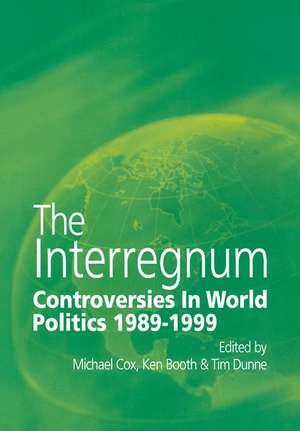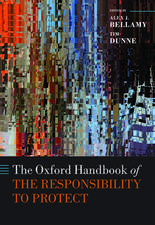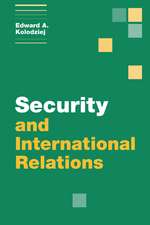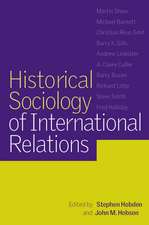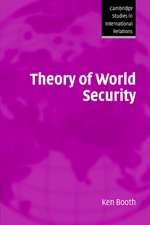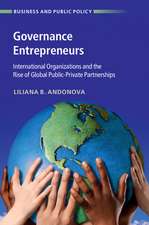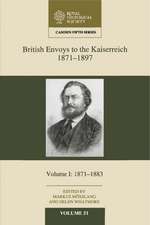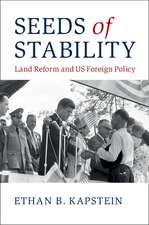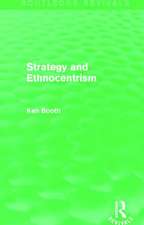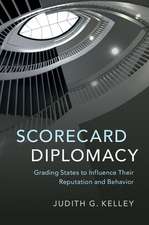The Interregnum: Controversies in World Politics 1989–1999
Editat de Michael Cox, Ken Booth, Tim Dunne Cuvânt înainte de Christopher J. Hillen Limba Engleză Paperback – 12 apr 2000
Preț: 245.65 lei
Nou
Puncte Express: 368
Preț estimativ în valută:
47.02€ • 48.89$ • 39.34£
47.02€ • 48.89$ • 39.34£
Carte tipărită la comandă
Livrare economică 15-29 martie
Preluare comenzi: 021 569.72.76
Specificații
ISBN-13: 9780521785099
ISBN-10: 052178509X
Pagini: 312
Ilustrații: 3 b/w illus. 5 tables
Dimensiuni: 168 x 243 x 17 mm
Greutate: 0.62 kg
Ediția:New.
Editura: Cambridge University Press
Colecția Cambridge University Press
Locul publicării:Cambridge, United Kingdom
ISBN-10: 052178509X
Pagini: 312
Ilustrații: 3 b/w illus. 5 tables
Dimensiuni: 168 x 243 x 17 mm
Greutate: 0.62 kg
Ediția:New.
Editura: Cambridge University Press
Colecția Cambridge University Press
Locul publicării:Cambridge, United Kingdom
Cuprins
Acknowledgements; Foreword Christopher J. Hill; Notes on contributors; Introduction Michael Cox, Ken Booth and Tim Dunne; Part I. Historical Perspectives: 1. The rise and fall of the Cold War in comparative perspective Richard Ned Lebow; 2. History ends, worlds collide Chris Brown; 3. Globalization and national governance: antinomies or interdependence? Linda Weiss; 4. Beyond Westphalia?: Capitalism after the 'fall' Barry Buzan and Richard Little; Part II. Contending Visions: 5. The potentials of Enlightenment Fred Halliday; 6. Marxism after Communism Andrew Gamble; 7. Liberalism since the Cold War: an enemy to itself? Geoffrey Hawthorn; 8. Clausewitz rules, OK? The future is the past - with GPS Colin Gray; Part III. Geopolitical Landscapes: 9. Mission impossible? The IMF and the failure of the market transition in Russia Peter Rutland; 10. Europe after the Cold War: interstate order or post-Sovereign regional system? William Wallace; 11. Where is the Third World now? Caroline Thomas; 12. Whatever happened to the Pacific century? Rosemary Foot and Andrew Walter; 13. Still the American century Bruce Cumings; Index.
Recenzii
'The Interregnum does what no other collection has managed thus far - it offers numerous paths of escape from the already exhausted label 'post-Cold War era'. This collection takes stock of the major intellectual fault lines emerging since 1989, sorting them and integrating them in new ways that avoid the excesses of cliché that characterize much recent discussion of globalization and so-called clashes of civilization. For those who seek to understand the nature of the current international system, this is the place to start.' Joel H. Rosenthal President, Carnegie Council on Ethics and International Affairs, New York
'The Interregnum is a fascinating and varied collection of essays on the confusions of the last decade. Some of the contributions go over familiar ground - others may merely annoy; but several are notably illuminating and thought-provoking.' Robert O. Keohane, Department of Political Science, Duke University
'Both individually and collectively, the thirteen essays assembled here raise far more questions than they answer. But they are profound and troubling questions about the structure and dynamics of world politics that have ensured in the ten years since the end of the Cold War … a period filled with contradictions, ambiguities, and uncertainties hard to fathom and yet crucial to understanding where the world is heading in the 21st century. Readers will surely find themselves continuously provoked as they work their way through the book seeking to find for themselves the deeper meanings of the Interregnum, as the editors call the century's last decade.' James N. Rosenau, University Professor of International Affairs
'This is an impressive, comprehensive treatment of what international relations theorists have learned throughout the 'hot peace' decade that followed the cold war. Self-described realists remind us of the importance of remembering Marx, the social scientist, in this era of triumphal capitalism. Putative Marxists restate the relevance of Kant, the historian and ethicist, in a world in which depoliticizing postmodernists question the substance of triumphal liberalism. And scholars across paradigms emphasize the centrality of classical theorizing to the conflict and inequality of the current world.' Craig N. Murphy, M. Margaret Ball Professor of International Relations and Chair, Department of Political Science, Wellesley College
'With precise and careful identification of the most important issues, this timely volume offers clearheaded and comprehensive analysis of world politics over the last decade. Finally we approach a much better understanding of what has changed and what remains of the old order. Highly recommended to students and scholars alike.' George Sorensen, University of Aarhus
'The Interregnum is a fascinating and varied collection of essays on the confusions of the last decade. Some of the contributions go over familiar ground - others may merely annoy; but several are notably illuminating and thought-provoking.' Robert O. Keohane, Department of Political Science, Duke University
'Both individually and collectively, the thirteen essays assembled here raise far more questions than they answer. But they are profound and troubling questions about the structure and dynamics of world politics that have ensured in the ten years since the end of the Cold War … a period filled with contradictions, ambiguities, and uncertainties hard to fathom and yet crucial to understanding where the world is heading in the 21st century. Readers will surely find themselves continuously provoked as they work their way through the book seeking to find for themselves the deeper meanings of the Interregnum, as the editors call the century's last decade.' James N. Rosenau, University Professor of International Affairs
'This is an impressive, comprehensive treatment of what international relations theorists have learned throughout the 'hot peace' decade that followed the cold war. Self-described realists remind us of the importance of remembering Marx, the social scientist, in this era of triumphal capitalism. Putative Marxists restate the relevance of Kant, the historian and ethicist, in a world in which depoliticizing postmodernists question the substance of triumphal liberalism. And scholars across paradigms emphasize the centrality of classical theorizing to the conflict and inequality of the current world.' Craig N. Murphy, M. Margaret Ball Professor of International Relations and Chair, Department of Political Science, Wellesley College
'With precise and careful identification of the most important issues, this timely volume offers clearheaded and comprehensive analysis of world politics over the last decade. Finally we approach a much better understanding of what has changed and what remains of the old order. Highly recommended to students and scholars alike.' George Sorensen, University of Aarhus
Notă biografică
Michael Cox is a Founding Director of LSE IDEAS and Emeritus Professor in International Relations at LSE. He was appointed to a Chair in International Relations at the School in 2002. His more recent publications include a new edition of EH Carr's The Twenty Years' Crisis and a collection of his own essays entitled The Post-Cold War World, which was published in 2018. 2019 saw the publication of his new edition of JM Keynes's The Economic Consequences of the Peace, and in 2021 he edited and brought out EH Carr's 1945 long out of print classic, Nationalism and After. His most recent book, Agonies of Empire: American Power from Clinton to Biden, was published in 2022. He is currently completing a volume for Polity Books called Comrades: Xi Jinping, Putin and the Challenge to Western Liberal Order.
Descriere
Leading scholars shed light on the meanings of world politics.
